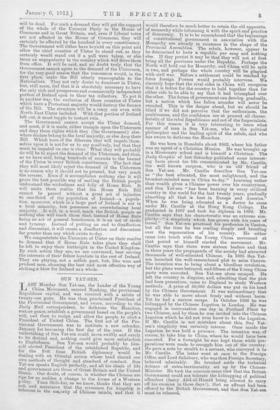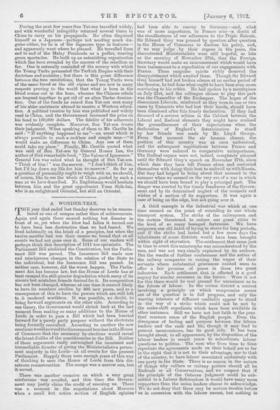SUN YAT-SEN. L AST Monday Sun Yat-sen, the Leader of the
Young China Movement, entered Nanking, the provisional Republican capital, and was received with a salute of twenty-one guns. He was then proclaimed President of the Provisional Government, and swore, according to the Daily Mail correspondent, to dethrone the Manchus, restore peace, establish a government based on the people's will, and then to resign and allow the people to elect a President of United China. The first act of the Pro- visional Government was to institute a new calendar, January 1st becoming the first day of the year. If the undertaking of Sun Yat-sen could move swiftly and surely to its desired end, nothing could give more satisfaction to Englishmen. Sun Yat-sen would probably be him- self elected President of the established Republic, and for the first time British diplomacy would be dealing with an Oriental nation whose head shared our own methods of thought and standard of conduct. Sun Yat-son speaks English perfectly, and all his ideals of life and government are those of Great Britain and the United States. Our doubt, of course, is whether the Chinese are ripe for so sudden a change to the forms of a Western polity. Yuan Shih-kai, as we know, thinks that they are not, and maintains that the reverence for kingship is inherent in the majority of Chinese minds, and that it would therefore be much better to retain the old apparatu. of monarchy while informing it with the spirit and practice of democracy. It is to be remembered that the beginnings of constitutional government in association with the Monarchy are already in existence in the shape of the Provincial Assemblies. The rebels, hoiTever, appear to be determined to have a republic pur sang and nothing else. If they persist it may be that they will not at first bring all the provinces under the Republic. Perhaps the North will hold out for Monarchy, and China will be split in two, and perhaps the whole country will be plagued with civil war. Before a settlement could be reached by force foreign Powers would probably intervene. We sincerely hope that the rival sides in China will recognize that it is better for the country to hold together than for either side to be able to say that it had triumphed over the other. The forms of government can develop gradually. but a nation which has fallen asunder will never be reunited. This is the danger ahead, but we should be blind if we did not perceive that the enthusiasm, the positiveness, and the confidence are at present all charac- teristic of the rebel Republicans and not of the Imperialists. For this reason it is very interesting to learn what manner of man is Sun Yat-sen, who is the political philosopher and the leading spirit of the rebels, and who has sworn to dethrone the Manchus.
He was born in Honolulu about 1862, where his father was an agent of a Christian Mission. He was brought up in a Missionary school and is himself a Christian. The Daily Graphic of last Saturday published some interest- ing facts about his life communicated by Mr. Cantlie, the well known surgeon, who is an old friend of Sun Yat-sen. Mr. Cantlie describes Sun Yat-sea as " the best educated, the most enlightened, and the broadest-minded man in China to-day." Learning rather than wealth gives a Chinese power over his countrymen, and Sun Yat-sen " has been learning in every civilized country in the world for the last twenty years, gradually absorbing all that is best in Europe and America." When he was being educated as a doctor he came under Mr. Cantlie at the Hong Kong College. He graduated in 1887 and took his diploma in 1892. Mr. Cantlie says that his characteristic was an extreme sum- plicity—" a simplicity which has grown with his years of travel." Sun Tat-son practised his profession in Canton. but all the time he was reading deeply and brooding over the regeneration of his country. He either came into touch with the Young China movement at that period or himself started the movement. Mr. Cantlie says that there were sixteen leaders and that in three years the propaganda of the society had attracted thousands of well-educated Chinese. In 1895 Sun Tat- sen launched the well-remembered plot to seize Canton. The intention was to bring about a bloodless revolution. but the plans were betrayed, and fifteen of the Young China party were executed. Sun Yat-sen alone escaped. He left the country in disguise, and, admitting that the plot had been premature, came to England to study Western methods. A price of 50,000 dollars was put on his head by the Chinese Government. It was extraordinary that lie was able to move about freely and without harm. Yet he had a narrow escape. In October 1896 he was kidnapped by the Chinese Legation in London. He was engaged in conversation one day. in Portland Place by two Chinese, and by them he was invited into the Chinese Legation which he did not even know to be the Legation. If Mr. Cantlie is not mistaken about this, Sun Tat- sen's simplicity was certainly intense. Once inside the Legation he was held a prisoner. The intention was, of course, to take him to China, where he would have been executed. For a fortnight he was kept there while pre- parations were made to smuggle him out of the country. He gave a note by stealth to a servant, who conveyed it to Mr. Cantlie. The latter went at once to the Foreign Office, and Lord Salisbury, who was then Foreign Secretary, behaved admirably. He brushed aside the technical defence of extra-territoriality set up by the Chinese Minister. He took the common-sense view that the British Government could not tolerate the kidnapping of political offenders (fancy Abd-ul-Hamid being allowed to carry off his enemies in those days !), that an affront had been offered to the British Government, and that Sun Tat-son must be released. During the next few years Sun Yat-sen travelled widely, and with wonderful intrepidity returned several times to China to carry on his propaganda. Ho often disguised himself as a Japanese—perhaps not needing much dis- guise either, for he is of the Japanese type in features— and apparently went where he pleased. He travelled from end to end of the Malay Peninsula as a pedlar, wearing green spectacles. He built up an astonishing organization which has been revealed by the success of the rebellion so far. One is naturally reminded of the secrecy with which the Young Turks permeated the Turkish Empire with their doctrines and societies ; but there is this great difference between the two revolutions, that the Young Turks were of the same breed as the old regime and are now in many respects proving to the world that what is born in the blood comes out in the bone, whereas the Chinese rebels are leagued together to get rid of an alien Tartar domina- tion. Out of the funds he raised Sun Yat-son sent many of his abler assistants abroad to receive a Western educa- tion. A political treatise by him was published and widely read in China, and the Government increased the price on his head to 180,000 dollars. The fidelity of his adherents was evidently complete. Moreover, Sun. Yat-sen trusts their judgment. When speaking of them to Mr. Cantlie he said : " If anything happened to rile "—an event which is always possible to such a reckless and simple man—" it would make no difference to China. Any one of them could take my place." Finally, Mr. Cantlie quoted what was said of Sun Yat-sen by General Homer Lea, the author of that remarkable book, " The Valour of Ignorance." General Lea was asked what he thought of Sun Yat-sen. '• Think of him ! " was the answer. "I don't think of him, but I'd lay down my life for him to-morrow." So far as a question of personality ought to weigh with us, we should, of course, like to see the whole of China guided by such a man as we have described. No Englishman would hesitate between him and the great opportunist Yuan Shih-kai, who is an enlightened Oriental, but still an Oriental.



















































 Previous page
Previous page